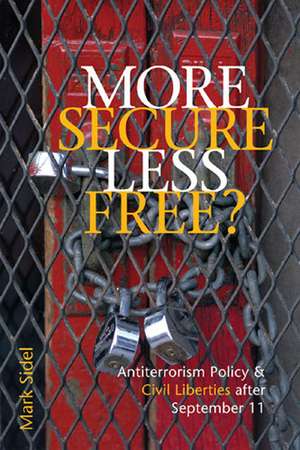More Secure, Less Free?: Antiterrorism Policy & Civil Liberties after September 11
Autor Mark Sidelen Limba Engleză Paperback – 24 ian 2007
The first comprehensive analysis of the full range of antiterror initiatives undertaken in the United States after the 2001 terrorist attacks
Unlike earlier books published shortly after the September 11 attacks that focus on the Patriot Act, More Secure, Less Free? covers the Patriot Act but goes well beyond, analyzing Total Information Awareness, Terrorist Information and Prevention System (TIPS), Computer Assisted Passenger Prescreening System II (CAPPS II), and a number of other "second wave" antiterror initiatives.
It's also the first book of its kind to go beyond federal measures to explain the devolution of antiterror policies to the states, and now to the military as well. Author Mark Sidel discusses the continuing debates on antiterror law at the state level, with a focus on the important states of New York, California, and Michigan, and explains how the military-through an informant program known as "Eagle Eyes"-is now taking a direct hand in domestic antiterror efforts.
The volume also discusses and analyzes crucially important aspects of American antiterror policy that have been largely ignored in other volumes and discusses the effects of antiterror policy on the American academic world and the American nonprofit sector, for example. And it provides the first comparative perspectives on U.S. antiterror policy yet published in an American volume, discussing antiterror initiatives in Great Britain, Australia, and India and contrasting those to the American experience.
More Secure, Less Free? is important and essential reading for anyone interested in an analytical perspective on American antiterror policy since September 11 that goes well beyond the Patriot Act.
Unlike earlier books published shortly after the September 11 attacks that focus on the Patriot Act, More Secure, Less Free? covers the Patriot Act but goes well beyond, analyzing Total Information Awareness, Terrorist Information and Prevention System (TIPS), Computer Assisted Passenger Prescreening System II (CAPPS II), and a number of other "second wave" antiterror initiatives.
It's also the first book of its kind to go beyond federal measures to explain the devolution of antiterror policies to the states, and now to the military as well. Author Mark Sidel discusses the continuing debates on antiterror law at the state level, with a focus on the important states of New York, California, and Michigan, and explains how the military-through an informant program known as "Eagle Eyes"-is now taking a direct hand in domestic antiterror efforts.
The volume also discusses and analyzes crucially important aspects of American antiterror policy that have been largely ignored in other volumes and discusses the effects of antiterror policy on the American academic world and the American nonprofit sector, for example. And it provides the first comparative perspectives on U.S. antiterror policy yet published in an American volume, discussing antiterror initiatives in Great Britain, Australia, and India and contrasting those to the American experience.
More Secure, Less Free? is important and essential reading for anyone interested in an analytical perspective on American antiterror policy since September 11 that goes well beyond the Patriot Act.
Mark Sidel is Associate Professor of Law at the University of Iowa and a research scholar at the University's Obermann Center for Advanced Studies.
Preț: 154.77 lei
Nou
Puncte Express: 232
Preț estimativ în valută:
29.63€ • 30.86$ • 24.59£
29.63€ • 30.86$ • 24.59£
Carte indisponibilă temporar
Doresc să fiu notificat când acest titlu va fi disponibil:
Se trimite...
Preluare comenzi: 021 569.72.76
Specificații
ISBN-13: 9780472031733
ISBN-10: 0472031732
Pagini: 248
Dimensiuni: 140 x 210 x 15 mm
Greutate: 0.29 kg
Editura: UNIVERSITY OF MICHIGAN PRESS
Colecția University of Michigan Press
ISBN-10: 0472031732
Pagini: 248
Dimensiuni: 140 x 210 x 15 mm
Greutate: 0.29 kg
Editura: UNIVERSITY OF MICHIGAN PRESS
Colecția University of Michigan Press
Notă biografică
Mark Sidel is Associate Professor of Law at the University of Iowa and a research scholar at the University's Obermann Center for Advanced Studies.
Recenzii
"The most complete analysis of the civil liberties aspect of the ongoing war on terrorism. . . . Sidel dispassionately examines the tension between the need to guard against another massive attack on U.S. soil and the need to maintain a free and open society. . . . [E]ven if you don't agree with him, the arguments are compelling and demand serious consideration."
---Legal Intelligencer
---Legal Intelligencer
"In his slender, fact-packed and worrying volume, Mark Sidel . . . takes a careful and searching look at the unprecedented terror attack of 2001 and its impact. . . . [T]he issue of security versus freedom will be fiercely debated for years, which only makes Sidel's More Secure, Less Free? essential reading."
---History News Network
---History News Network
"The normal tension between freedom and security is under particular strain since 9-11, and Mark Sidel documents the silent and steady erosion of privacy and the public's right to know. At the same time that government agencies and their private sector partners are quietly building databases to store information about the public, it is becoming harder and harder for the public to learn what government agencies themselves are up to even about those new databases. Mark Sidel shows how government for, by, and of the people can quietly become an indirect casualty in a war on terrorism, unless we are vigilant."
---Senator Patrick Leahy, Ranking Member, Senate Judiciary Committee
---Senator Patrick Leahy, Ranking Member, Senate Judiciary Committee
Descriere
An up-to-the-minute analysis of the government war on privacy
